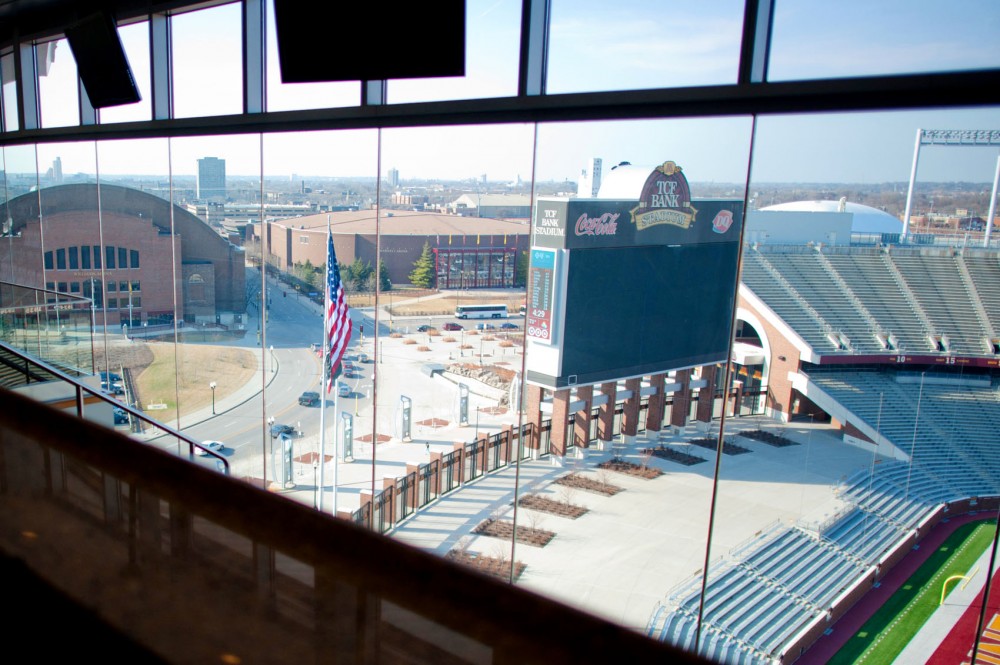Gopher fans might soon be able to purchase alcohol at TCF Bank Stadium with a legislative policy change.
A bill passed Wednesday in the House Commerce and Regulatory Reform Committee would allow beer sales in the 37 stadium suites and in a designated area in or near the stadium for the general public.
Bill sponsor Rep. Joe Atkins, DFL-Inver Grove Heights, said that area, which he called a “beer garden,” would be in the plaza beneath the west scoreboard on the open side of the stadium. The permitted alcohol location will not be determined by the bill, however.
If the bill goes through the Legislature, it will be up to the Board of Regents to approve alcohol sales and determine where the beer garden would go.
Regents Chair Linda Cohen said she thought the amendment is a “very good idea.”
Last year, the University didn’t sell all of its suites, she said. The University’s interest isn’t in selling alcohol, but selling its seats. She said she believes that corporations will be more likely to lease suites if alcohol sales are allowed.
Alcohol sales in a beer garden would be more controlled than if beer were sold in the student section, she said.
Supporters of the bill say the University would gain $1.5 million to $2 million a year in revenue.
University Chief Financial Officer Richard Pfutzenreuter emphasized that any increase in revenue for the University would come from increased lease prices for suites.
“It’s really not in the actual sale of the product that you make money,” Pfutzenreuter said. “It’s in the clubs and the suites section of the stadium.”
Atkins said the beer garden is a compromise between the University’s desire to contain alcohol sales and the Legislature’s insistence on making alcohol available for the general public.
He amended the omnibus liquor bill to include the change. The bill includes several other liquor bills, which could be up for discussion on the House floor sometime this week, Atkins said.
If passed in the House it would then move to the Senate and Gov. Mark Dayton for final approval.
“If you can pass something in the House regarding TCF Stadium and beer at TCF that is the main obstacle,” Atkins said.
Atkins said he’s getting more optimistic about the bill passing as he talks with more representatives. He said it has better than a 50-50 chance which is “pretty good.”
Dayton’s press secretary Katharine Tinucci said the governor has not taken a stance on the policy yet.
Alcohol was not sold at the stadium when the Vikings played one game there in December 2010. The bill’s language includes any Vikings game that would be played at TCF.
Under the proposed Vikings stadium plan, the team would play at TCF for an undetermined amount of time while the new stadium is built.
The bill is not connected to any negotiations with the Vikings to allow them to play on campus, said Chuck Tombarge, a spokesman for the University.
He said this issue is one “the University has been hoping to address for a while.”
Originally, the University intended to limit sales to serve beer only to fans in premium seats like stadium suites.
The University wanted to keep alcohol sales in “controlled areas,” said Garry Bowman, director of athletics communications.
Legislators thought that only serving alcohol to fans in suites would be discriminatory against certain fans and “elitist,” Atkins said.
Legislators restricted the liquor license so that beer sales could only be made available if available to all fans.
The University decided to vote for an alcohol-free policy, Bowman said.
But because of the change, the University had to take some losses with a decrease in the lease prices.
The University offered two discount options for leasers: a 10 percent discount per year or 20 percent discount for the total cost of the lease, Bowman said.
Another complication for the bill is that it would be up for renewal after two years, Pfutzenreuter said.
The leases for suites can be anywhere from one to several years.
This means there is a “mismatch” when individual leases and the legislation are up for renewal, he said, which further complicates pricing the suites.
















